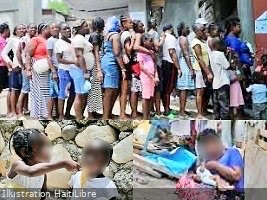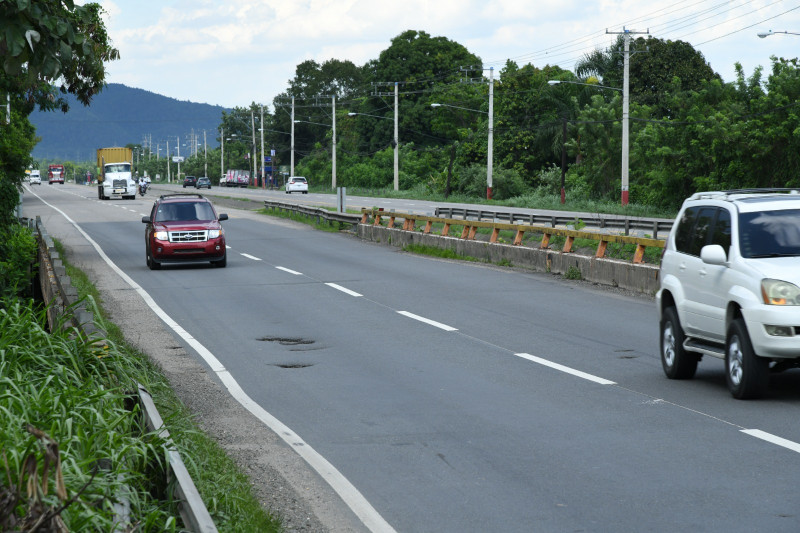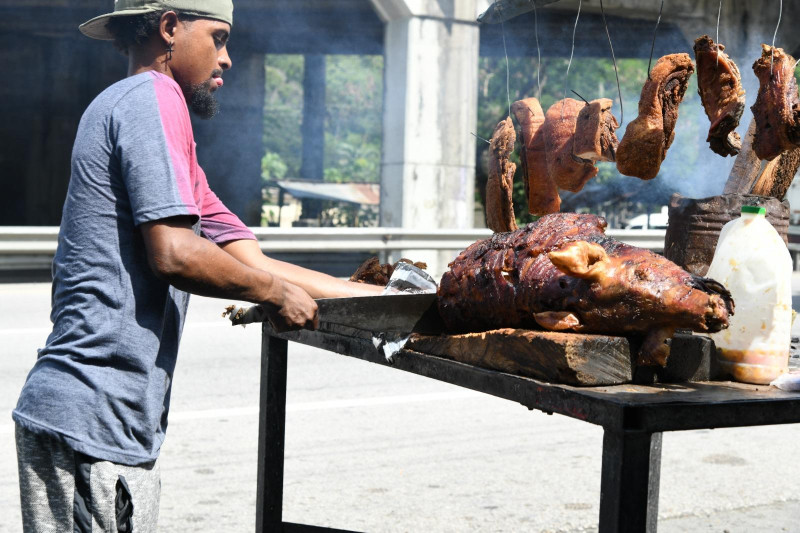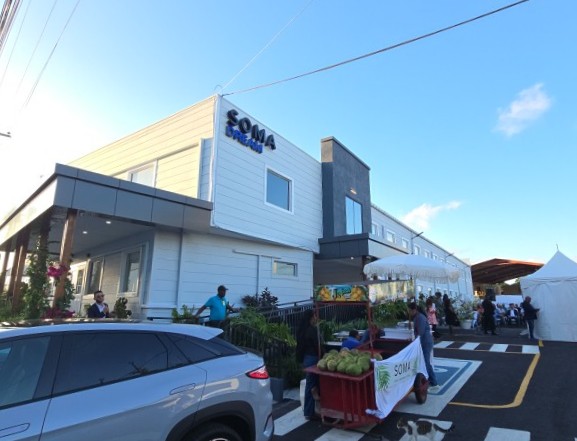In a significant organizational restructuring, the Energy Bedrijven Suriname (EBS) has announced major changes to its leadership during its annual general shareholders’ meeting. Armand Bipat, who assumed the role of Technical Director in January this year following Marcel Eijndhoven’s departure, has been relieved of his duties. Stepping into the position of Chief Technical Officer (CTO) is Rishidath Mathoera, the current secretary of the EBS union.
博客
-

Social : 50 Haitian role models and inspirations 2025 (list, video)
On October 8, 2025, the Network of Haitian Women Models and Inspirers (REFEHMI) unveiled plans for its 6th annual tribute ceremony, set to take place on January 9 and 10, 2026, in Port-au-Prince. Titled ‘Fanm se rasin’ (Women are the roots), the event will honor 50 Haitian women who have made significant contributions to society, emphasizing their pivotal role in fostering stability and upholding values. Since its inception in 2020, REFEHMI has recognized over 250 women across diverse fields, including education, governance, culture, health, entrepreneurship, and environmental advocacy. This year’s honorees are being celebrated for their dedication to advancing the Sustainable Development Goals (SDGs), particularly SDG 5, which focuses on gender equality. Eunice Cincir, the founder of REFEHMI, described the theme as a declaration of acknowledgment, stating, ‘Haitian women are the memory, strength, and lifeblood of a resilient nation.’ Rodia Pyram Chavannes, Chair of the 6th edition’s organizing committee, highlighted the initiative’s goal to institutionalize the recognition of female leadership and amplify the voices of women who work tirelessly to propel Haiti forward. Dr. Esther Chrysostome, Head of the Communication and Citizen Engagement Subcommittee, emphasized that REFEHMI’s mission extends beyond celebration, fostering active citizenship and collective commitment to building an inclusive Haiti. The complete list of the 50 honorees is available for download in PDF format.
-

Social : «An alarming reality» hunger continues to gain ground in the country
Haiti is grappling with a deepening hunger crisis, as revealed in a recent report presented on October 10, 2025. The findings, shared during a session organized by the National Coordination for Food Security (CNSA), highlight that over half of Haiti’s 11 million population now suffers from acute food insecurity, with nearly two million in emergency situations. The event was attended by key figures, including Presidential Transition Advisor Louis Gérald Gilles, Axène Joseph from the Prime Minister’s Office, and Vernet Joseph, Minister of Agriculture and Natural Resources, alongside representatives from the FAO and the World Food Programme (WFP).
In Port-au-Prince and beyond, markets are emptying, prices are skyrocketing, and families are forced to cut back on meals. Between August 2024 and July 2025, consumer prices surged by over 30%, with food costs rising by a third year-on-year. Field surveys indicate that households in the capital’s working-class neighborhoods spend up to 65% of their income on food.
The report underscores that four out of ten households face moderate to severe hunger, with nearly half resorting to debt to feed themselves. The most vulnerable are those dependent on small businesses, transportation, or subsistence farming—sectors now crippled by ongoing clashes and roadblocks. Regions such as the Northwest, Artibonite, La Gonâve, and displaced persons camps in Port-au-Prince are classified as experiencing urgent food insecurity. Areas like Cité Soleil, Croix-des-Bouquets, Tabarre, Delmas, and Pétion-ville are also in critical condition.
While no areas are currently classified as facing famine, the report warns that the situation could worsen rapidly if humanitarian aid diminishes. In several departments, at least a quarter of households rely on food assistance to survive. Six million Haitians now live below the poverty line, surviving on less than $2.41 a day. Analysts describe the crisis as a shift from a temporary emergency to a permanent state of hunger.
In response, the Presidential Transitional Council and the Government have launched the Food and Nutrition Security Crisis Redress and Response Plan. This initiative aims to mobilize resources swiftly, ensure transparent financial monitoring, and strengthen sector governance. Councilor Louis Gérald Gilles announced that the CNSA would be transformed into the National Office for Food and Nutrition Security to enhance coordination and crisis response. In his address, Gilles called for collective action, stating, ‘Together, we can save lives, protect livelihoods, and strengthen the country’s food resilience.’
-

The Duarte Highway, 50 potholes between Santo Domingo and Santiago complicate traffic
Santo Domingo, DR — On April 6, 2025, the new toll station at kilometer 32 commenced operations, signaling a significant milestone in the ongoing remodeling and expansion of the Juan Pablo Duarte Highway. While this development represents progress, it does not signify the completion of the ambitious project aimed at addressing the highway’s long-standing issues of deterioration and safety hazards.
A recent inspection by Listín Diario journalists revealed that despite recent renovations, the highway still suffers from numerous potholes. During a round trip from the Santo Domingo toll station to Santiago, over 50 potholes of varying sizes were documented. Notably, three potholes were found near the Montaña Paraíso recreation area and the Villas del Bosque ecotourism project at kilometer 52, a section that appeared to have been recently remodeled. Additionally, five more potholes were identified between Villas Las Marías and the San José del Puerto detachment, despite evident paving efforts.
Further along the route, 11 potholes were counted from kilometer 58 to the entrance of Bonao, and another 12 were observed from Talleres Juma to the Sabaneta bridge in La Vega. In the north-south direction, seven potholes were noted between the GM Muebles store and the Atlantic gas station, with some affecting the motorcycle lanes. Near the Doña Pula barbecue restaurant and the Profesor Juan Ramón de la Cruz Primary School, six additional potholes were spotted. Although most potholes on the Piedra Blanca overpass were paved, some remained unaddressed. Finally, 10 more potholes were identified in the last 32 kilometers leading to Santo Domingo.
The Ministry of Public Works and Communications (MOPC), responsible for the project since 2022, has made strides in repairing many potholes. However, some repaired areas still exhibit slight depressions, and several potholes remain uncovered, highlighting the challenges in achieving a fully safe and smooth roadway.
-

Regional data center in Guyana can cost US$3 billion
Guyana is poised to become a technological hub for the Caribbean with the proposed development of a state-of-the-art data center, estimated to cost between US$2 billion and US$3 billion. President Irfaan Ali unveiled this ambitious plan during the grand opening of the SOMA Hotel and Restaurant, a venture by TOTALTEC Group, on October 11, 2025. The project aims to establish Guyana as a regional leader in innovation, computing, and data storage. The data center, requiring vast land and a stable, cost-effective energy supply, is expected to support various industries, including FinTech, digitization, and modernisation across the Caribbean. President Ali emphasized the strategic importance of this investment, envisioning Guyana as the sovereign storage and computing hub for the region. The initiative aligns with ExxonMobil Guyana’s appraisal of hydrocarbon resources at Longtail in the Stabroek Block, which could fuel energy plants and other industrial facilities. The SOMA Hotel, a symbol of local economic growth, will employ 60 to 100 Guyanese and source materials locally, reflecting the nation’s commitment to sustainable development.
-

Wie het verkiezingsproces draaiend hield, wacht al 5 maanden op uitbetaling
Despite the orderly conduct of the elections in accordance with established guidelines, agreements, and training, the poll workers who dedicated their efforts remain unpaid. Nationwide, an average of ten citizens per district—totaling sixty-two districts—served as poll workers. These individuals carried out their duties diligently, despite exhaustion, challenging conditions, and occasional shortcomings, in compliance with the 2025 Electoral Decree. Remarkably, five months later, these citizens are still relying on assurances from the Minister and the Director of Internal Affairs. While it is claimed that the full payment lists have been prepared and submitted to the Ministry of Finance and Planning, the disbursement is contingent on available financial resources. These citizens performed a vital national service, ensuring the smooth execution of the voting and counting processes. Their responsibilities carried significant accountability, and many endured considerable hardships, including lengthy river journeys through the dense rainforest and inadequate accommodations alongside police and military personnel—all in the interest of democracy. Meanwhile, the new Assembly members were sworn in on June 29, 2025, followed by the inauguration of the President and Vice President on July 16, 2025. Subsequently, the ministers and deputy ministers of the Simons-Rusland cabinet were sworn in at the presidential palace. None of these constitutional steps would have been possible without the dedication of the poll workers. The sudden withdrawal of registered personnel had previously caused tense moments for the election organizers. The message of this article is clear: Financial settlements must be finalized by the end of October 2025, or at the latest, before November 25, 2025. Marcellino Nerkust, Former Chairman of Polling Station 666, Boven-Coppename District, Witagron.
-

Caesar promises ‘blue school to train young fishers’
In a recent rally held in Layou, Minister of Agriculture Saboto Caesar outlined a series of ambitious initiatives aimed at bolstering the agricultural and fisheries sectors in St. Vincent and the Grenadines (SVG). Speaking to supporters of the ruling Unity Labour Party (ULP), Caesar emphasized the party’s commitment to establishing a ‘blue school’ to train young fishers in longline fishing and operate a dedicated fishing fleet if re-elected for a sixth term. Additionally, the ULP plans to set up an abattoir for livestock farmers and expand buying depots in key locations such as Langley Park, Lauders, La Croix, Vincy Fresh at Diamond, and Belmont. These measures are designed to enhance the competitiveness of local farmers and fishers both regionally and globally. Caesar, who has led the agriculture ministry since 2010, highlighted the establishment of the Eastern Caribbean Food Traders Ltd., which aims to purchase produce from local farmers, ensuring they can compete effectively in international markets. The minister also underscored the ULP’s achievements in education, healthcare, and disaster recovery, including the successful handling of the COVID-19 pandemic and the aftermath of the La Soufriere volcanic eruption. Caesar expressed confidence in the ULP’s ability to secure another term, citing the party’s track record of delivering tangible benefits to the people of SVG. He urged supporters to remain steadfast in their commitment to the ULP, emphasizing the party’s role in advancing the nation’s development and improving the livelihoods of its citizens.
-

FLASH : HOPE/HELP Law between optimism and concern in the Haitian textile sector
The Haitian Hemispheric Opportunity Through Partnership for Encouragement (HOPE) laws and the Haiti Economic Lift Program (HELP) law, which expired at the end of September 2025, have left the Haitian textile sector in a state of uncertainty. These laws, initially approved by the U.S. Congress in 2005 and 2010, allowed Haiti to export clothing to the U.S. market duty-free, accounting for 90% of the country’s exports. The benefits also extended to the Dominican Republic, where textile mills produced fabrics and yarns sent to Haiti for garment production. In 2018, the sector employed 62,000 people, but due to security concerns, this number has plummeted to 26,000, with at least 15 factories closing. Fernando Capellan, president of the Industrial Development Company (CODEVI), remains optimistic about the laws’ renewal within the next 90 days, citing support from the White House and the program’s impact on the U.S. supply chain. However, Haiti’s Minister of Trade and Industry, James Monazard, expressed concern over the alarming situation, warning that without renewal, many companies in the subcontracting sector—a cornerstone of Haiti’s economy—could face closure. Political disagreements in the U.S. Congress have further delayed any decision, with the Trump administration expected to make a final call by December 19, 2025. The future of Haiti’s outsourcing sector hangs in the balance as stakeholders await a resolution.
-

Roast pork, porcelain, or crabs: The stories found on the Duarte Highway
The Juan Pablo Duarte Highway, stretching from Santo Domingo to San Fernando de Monte Cristi, serves as more than just a transportation route—it is a vibrant artery of commerce and culture. Spanning six provinces, the highway is lined with vendors and artisans who have turned its bustling edges into thriving marketplaces. These individuals, often rooted in family traditions, showcase the rich diversity of regional products and crafts that define the Dominican Republic. Alejandro, a 27-year-old vendor, has spent over 15 years perfecting his trade of selling chicharrón, a popular pork-based delicacy. ‘I started at nine, helping with plates, and now I handle everything from cutting pigs to serving customers,’ he shared. Similarly, Ariel, a seasoned crab seller, has been offering jaibas (blue crabs) for more than two decades. He attributes his success to his father, who introduced him to the business. ‘This is how I make my living,’ Ariel remarked, highlighting the generational continuity of his craft. Beyond food, the highway is also a hub for artisans like Criselyn Cabreja, whose passion for crafts led her to establish ‘Hermanos Cabreja,’ a business specializing in handmade items. ‘I’ve always loved creating things with my hands,’ she said, reflecting on her journey from childhood hobbyist to successful entrepreneur. Rufino Hidalgo, another artisan, has spent over 20 years in the woodcraft business, crafting kitchen utensils and cockfighting cages. ‘These pieces are made entirely by hand, and the demand is always high,’ he explained. Together, these vendors and artisans embody the resilience and creativity of the Dominican people, transforming the Juan Pablo Duarte Highway into a living testament to their heritage and livelihoods.
-

Ali says new govt transaction apps will guarantee accountability
In a significant move to bolster transparency and efficiency in government transactions, President Irfaan Ali announced the upcoming launch of four innovative applications designed for the private sector to interact with the government. The announcement was made during the commissioning of the SOMA Hotel & Restaurant, a flagship project by TOTALTEC Group, located in Houston, East Bank Demerara. President Ali emphasized that these apps would enable a ‘transparent, productive, and efficient’ process for conducting government business, while also ensuring accountability among officials through digital tracking mechanisms. The system is engineered to detect and prevent malpractices, reinforcing trust in public administration. A collaborative meeting between government representatives and the private sector is scheduled in six weeks to officially roll out the apps. President Ali highlighted that this initiative reflects the government’s commitment to accountability and leveraging technology for sustainable growth. The SOMA Hotel & Restaurant, developed by TOTALTEC, is set to create 60 to 100 direct and indirect jobs, supporting local suppliers and aligning with Guyana’s workforce development goals. The project is part of a broader vision to expand affordable, high-quality hospitality services across Guyana, catering to business travelers and industrial clients. TOTALTEC, a Guyanese-owned company established in 2016, has been instrumental in advancing local content and sustainable development, having trained over 6,000 individuals for careers in the oil and gas industry.
